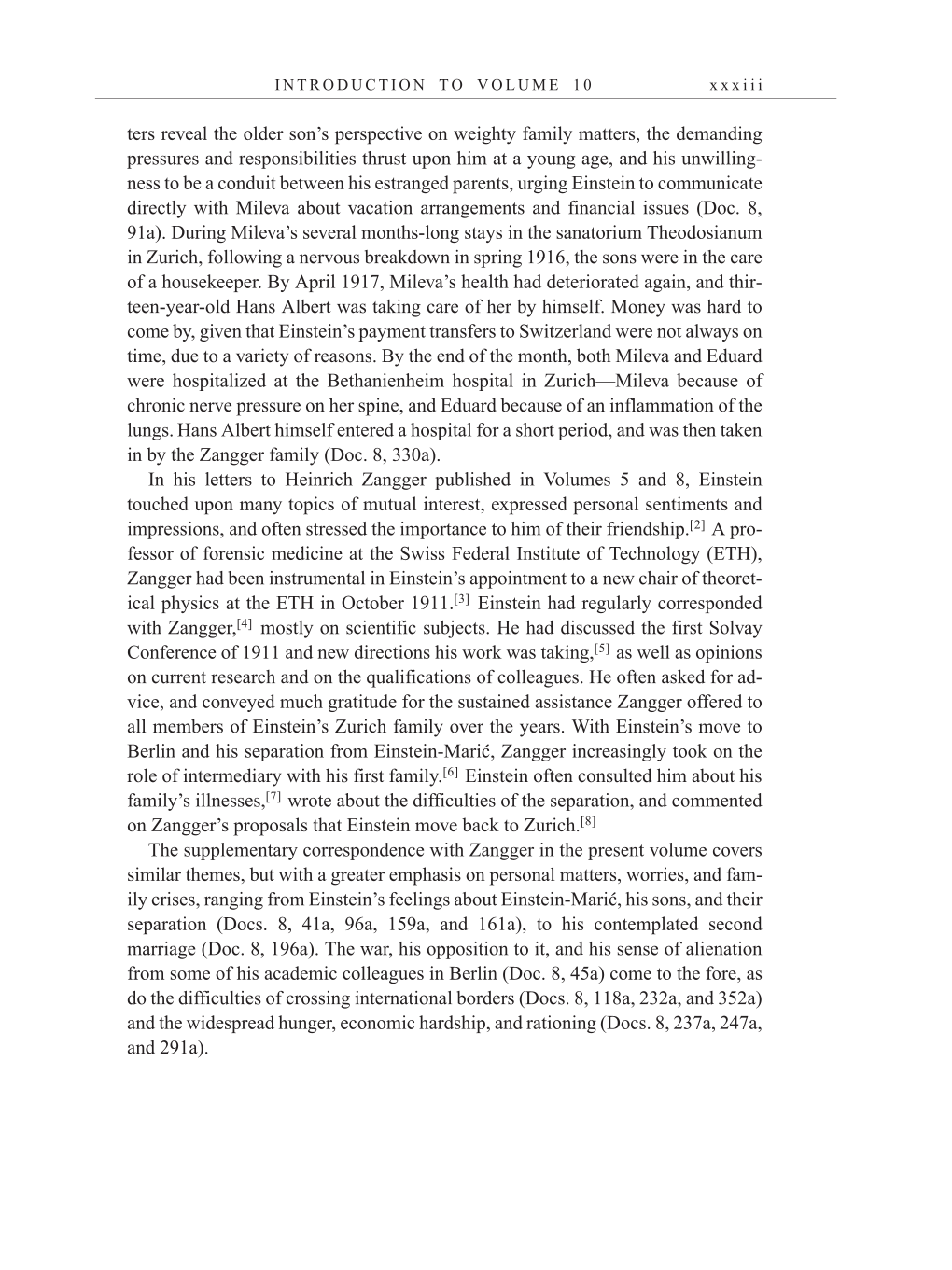I N T R O D U C T I O N T O V O L U M E 1 0 x x x i i i
ters reveal the older son’s perspective on weighty family matters, the demanding
pressures and responsibilities thrust upon him at a young age, and his unwilling-
ness to be a conduit between his estranged parents, urging Einstein to communicate
directly with Mileva about vacation arrangements and financial issues (Doc. 8,
91a). During Mileva’s several months-long stays in the sanatorium Theodosianum
in Zurich, following a nervous breakdown in spring 1916, the sons were in the care
of a housekeeper. By April 1917, Mileva’s health had deteriorated again, and thir-
teen-year-old Hans Albert was taking care of her by himself. Money was hard to
come by, given that Einstein’s payment transfers to Switzerland were not always on
time, due to a variety of reasons. By the end of the month, both Mileva and Eduard
were hospitalized at the Bethanienheim hospital in Zurich—Mileva because of
chronic nerve pressure on her spine, and Eduard because of an inflammation of the
lungs. Hans Albert himself entered a hospital for a short period, and was then taken
in by the Zangger family (Doc. 8, 330a).
In his letters to Heinrich Zangger published in Volumes 5 and 8, Einstein
touched upon many topics of mutual interest, expressed personal sentiments and
impressions, and often stressed the importance to him of their
friendship.[2]
A pro-
fessor of forensic medicine at the Swiss Federal Institute of Technology (ETH),
Zangger had been instrumental in Einstein’s appointment to a new chair of theoret-
ical physics at the ETH in October
1911.[3]
Einstein had regularly corresponded
with
Zangger,[4]
mostly on scientific subjects. He had discussed the first Solvay
Conference of 1911 and new directions his work was
taking,[5]
as well as opinions
on current research and on the qualifications of colleagues. He often asked for ad-
vice, and conveyed much gratitude for the sustained assistance Zangger offered to
all members of Einstein’s Zurich family over the years. With Einstein’s move to
Berlin and his separation from Einstein-Maric;, Zangger increasingly took on the
role of intermediary with his first
family.[6]
Einstein often consulted him about his
family’s
illnesses,[7]
wrote about the difficulties of the separation, and commented
on Zangger’s proposals that Einstein move back to
Zurich.[8]
The supplementary correspondence with Zangger in the present volume covers
similar themes, but with a greater emphasis on personal matters, worries, and fam-
ily crises, ranging from Einstein’s feelings about Einstein-Maric;, his sons, and their
separation (Docs. 8, 41a, 96a, 159a, and 161a), to his contemplated second
marriage (Doc. 8, 196a). The war, his opposition to it, and his sense of alienation
from some of his academic colleagues in Berlin (Doc. 8, 45a) come to the fore, as
do the difficulties of crossing international borders (Docs. 8, 118a, 232a, and 352a)
and the widespread hunger, economic hardship, and rationing (Docs. 8, 237a, 247a,
and 291a).
